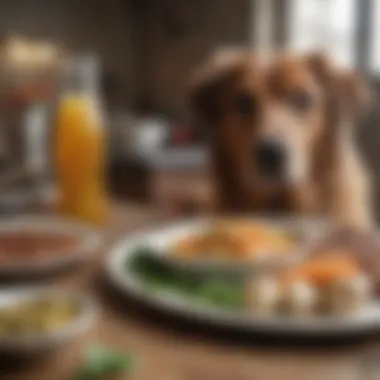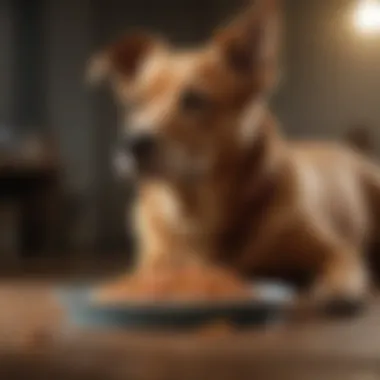Dietary Considerations for Dogs with Diarrhea: A Comprehensive Guide


Intro
Dogs, like humans, can experience gastrointestinal disturbances that lead to diarrhea. This condition can be triggered by various factors, including dietary changes, infections, or stress. Understanding how to manage a dog’s diet during such times is crucial for recovery. A well-considered diet can significantly support a dog's recovery while ensuring they receive the necessary nutrients. This article explores various food options, preparation methods, and nutritional guidelines to help pet owners make informed decisions for their dogs.
Understanding Your Pet
Breed Traits
Each dog breed has unique characteristics that can affect their dietary preferences and health. For instance, some breeds may have more sensitive stomachs and might require gentler food options, while others are more resilient. Recognizing these traits helps identify the best dietary approach during episodes of diarrhea.
Common Temperaments
Dogs can also display different temperamental traits. A nervous or anxious dog might suffer from stress-related diarrhea. On the other hand, a more robust breed might recover more quickly from dietary indiscretions. Understanding these temperamental characteristics aids in selecting suitable feeding practices during recovery.
Special Needs
Some dogs may have special dietary needs due to pre-existing health conditions, such as pancreatitis or allergies. It is crucial for pet owners to take these factors into consideration when selecting food options during a diarrhea episode. Consulting with a veterinarian helps tailor a diet that meets both short-term recovery goals and long-term health.
Nutrition and Feeding Guidelines
When a dog has diarrhea, it often requires a change in diet to ease its digestive system. Here are some guidelines for feeding:
- Bland Diets: Offer easily digestible foods. Chicken and rice or boiled potatoes are common options.
- Hydration: Always provide fresh water to prevent dehydration, a common risk associated with diarrhea.
- Small Portions: Feed smaller, more frequent meals rather than one or two large meals to ease digestion.
Important: Always consult a veterinarian if diarrhea persists for more than a day or two.
Health and Wellness
Maintaining a dog’s overall health is essential, especially during recovery from diarrhea. Here are several key aspects for continued wellness:
- Regular Vet Check-ups: Routine examinations help catch potential health issues early.
- Monitor Changes: Keep a close eye on any changes in behavior or appetite, which can be critical information for a vet.
- Probiotic Supplements: These can help restore the natural balance of gut bacteria after gastrointestinal disturbances.
Closure
Understanding Canine Diarrhea
Understanding canine diarrhea is crucial for pet owners. Diarrhea can signify a wide range of health issues, from mild gastrointestinal upset to more serious underlying conditions. This section will help identify common causes and symptoms, enabling informed decisions about your dog's care.
Common Causes of Diarrhea in Dogs
Diarrhea in dogs can stem from various causes. Recognizing these factors can assist in prompt treatment. Here are some leading causes:
- Dietary indiscretion: Dogs often eat things that upset their stomachs, including garbage or spoiled food.
- Infections: Bacterial, viral, and parasitic infections can lead to diarrhea. Common culprits include Salmonella and Parvovirus.
- Food allergies or sensitivities: Some dogs may react negatively to specific ingredients in their diet, leading to digestive disturbances.
- Medications: Certain medications may cause gastrointestinal issues as a side effect.
- Stress: Changes in the environment or routine can also affect a dog's digestive health.
By understanding these causes, pet owners can take steps to prevent diarrhea or seek timely veterinary intervention.
Signs and Symptoms to Observe
Identifying the signs and symptoms of diarrhea is essential for managing your dog's health. Look for:
- Increased frequency of bowel movements: More than two to three times a day can be concerning.
- Change in consistency: Watery stools indicate diarrhea, while soft stools may suggest a digestive upset.
- Presence of blood or mucus: This can signify a serious condition and warrants immediate veterinary attention.
- Lethargy: If your dog appears tired or unresponsive, it could indicate a more severe issue.
- Loss of appetite: A sudden decrease in food intake can signal gastrointestinal distress.
It is vital to monitor your pet closely, as changes in behavior can provide insight into their health status.


By being vigilant in observing these signs, pet owners can react swiftly to potential problems, ensuring their dogs receive the necessary care as soon as possible.
Immediate Actions to Take
When a dog experiences diarrhea, knowing how to respond quickly is fundamental. Immediate actions can significantly impact the duration and severity of gastrointestinal distress. Not only can these steps foster recovery, but they also help in preventing potential complications. By understanding how to assess the situation and when to seek further assistance, pet owners can provide their furry companions the best chances of a swift return to health.
Assessing the Severity of the Condition
To effectively address diarrhea in dogs, it's essential to assess the severity of the condition. This process involves observing various factors, such as the consistency and frequency of the stool, whether there are signs of dehydration, and any accompanying symptoms.
Here are key indicators to consider:
- Stool Consistency: Watery stools indicate more severe diarrhea than loose stools. It's crucial to take note of any blood or mucus present.
- Frequency: If your dog trips outside more than normal, it may signify a more serious issue.
- Accompanying Symptoms: Look for signs like vomiting, lethargy, or a loss of appetite. Such symptoms can reveal underlying medical problems.
- Duration: Diarrhea lasting for more than 24 hours requires immediate action.
Nutritional Guidelines for Dogs with Diarrhea
Dietary considerations are crucial when managing a dog's diarrhea because the right nutrition can significantly impact recovery. Diarrhea often leads to dehydration and nutrient loss. Furthermore, improper foods can exacerbate gastrointestinal distress, prolonging the condition. Establishing effective nutritional guidelines helps ensure that the dog's diet supports recovery while minimizing the risk of further complications. Adhering to these guidelines can result in quicker healing times and a return to a stable digestive state.
Essentials of a Bland Diet
A bland diet is fundamental during episodes of diarrhea. The goal is to provide easily digestible foods that do not irritate the digestive system. Offering a bland diet reduces the workload on the intestines and allows for better absorption of nutrients. Common components of a bland diet include:
- Plain White Rice: It is easy to digest, low in fiber, and helps solidify stools.
- Boiled Chicken: Skinless chicken breast is another gentle option that provides protein without excess fat.
- Pumpkin Puree: This food is rich in fiber and helps firm up loose stools, promoting regularity.
Gradually transitioning back to a regular diet after recovery is essential, as too much richness can trigger a relapse. It is advisable to introduce these bland foods in small portions to monitor the dog's reaction. If there is improvement, continue with the bland offerings until the dog is stable again. Observing the dog's response is key, and small adjustments may be necessary.
Role of Hydration in Recovery
Hydration plays a vital role in the recovery of dogs experiencing diarrhea. Loss of fluids through loose stools increases the risk of dehydration. Observing water intake is essential, and pet owners should encourage frequent but small sips. Adding electrolytes can be beneficial, encouraging oral rehydration solutions specifically designed for dogs.
Signs of dehydration include lethargy, dry mouth, and decreased skin elasticity, which can be detected by gently pinching the skin on the back. If the skin does not return to its original position promptly, this may indicate dehydration.
To promote hydration, consider the following strategies:
- Encourage Water Intake: Offer fresh water regularly and monitor intake.
- Broth: Providing low-sodium chicken or beef broth can make hydration more appealing.
- Wet Foods: Adding water to dry dog food or offering canned foods can increase moisture intake without forcing the dog to drink.
Recommended Foods for Recovery
When a dog is affected by diarrhea, the choice of food can considerably influence their recovery. What you feed them during this time is essential, not just for reassessing their digestive health but also for restoring them to their normal selves. Recommended foods focus on those that are gentle on the stomach, easy to digest, and can help firm up stools. It's vital to note that the right foods serve not only to provide nourishment but also to soothe the gastrointestinal tract. Incorporating these specific food options can accelerate healing and optimize overall health.
Plain White Rice
Plain white rice is notably one of the first foods recommended for dogs experiencing diarrhea. Its bland nature makes it easy on the stomach and serves two primary roles: providing easily digestible carbohydrates and acting as a binder to help firm up loose stools. This food lacks fiber, which is beneficial during recovery. It also has a neutral flavor that dogs usually accept without fuss. When offering plain white rice, ensure it is cooked thoroughly, without any seasoning or additives. This simple food is foundational in many recovery diets due to its effectiveness and digestibility.
Boiled Chicken
Boiled chicken is another staple in the diet of dogs with diarrhea. This protein source is recommended for its high digestibility and low fat content. Dogs often find boiled chicken appealing, which may encourage them to eat, even when their appetite is diminished. When preparing boiled chicken, ensure to remove the skin and bones, as these can complicate their digestive issues. Feeding small, shredded pieces can further assist digestion, making it easy for the dog to process. This is a good source of lean protein, helping to replenish nutrients lost during episodes of diarrhea.
Pumpkin Puree
Pumpkin puree is a natural and effective food option for managing gastrointestinal problems in dogs. It is rich in fiber, which can help stabilize the digestive system. The soluble fiber in pumpkin absorbs excess water in the intestinal tract, resulting in firmer stools. It's important to choose pure pumpkin puree without added sugars or spices; canned pumpkin without preservatives is an excellent choice. Adding pumpkin to your dog's bland diet can not only ease digestive upset but also provide essential vitamins like A and C, contributing to overall health.
Sweet Potatoes
Sweet potatoes serve as a nutritious addition to the recovery diet. They are rich in fiber and vitamins and offer more nutrients than white rice. When cooked and mashed, sweet potatoes can be easily digested and are usually well-accepted by dogs. This food has anti-inflammatory properties, which can further support healing. Be sure to serve sweet potatoes with no seasonings and ensure they are fully cooked for optimal digestibility. Sweet potatoes also offer a healthy source of carbohydrates to maintain energy levels during recovery.


Plain Yogurt
Plain yogurt can be beneficial for dogs recovering from diarrhea, particularly due to its probiotic content. These probiotics help restore the balance of healthy bacteria in the gut disrupted by illness. However, not all dogs tolerate dairy well, so it's crucial to monitor them after introduction. Choose unsweetened, low-fat yogurt, as added sugars or artificial ingredients can exacerbate gastrointestinal conditions. Serving a small amount may help digestion while providing a nutritious supplement to their diet.
Important Note: Always reintroduce any food gradually and observe for any adverse reactions.
In summary, these foods are safe and effective options for dogs recovering from diarrhea. They provide the necessary nutrients needed to promote healing. Choosing the right combination of these foods can optimize recovery while ensuring balanced nourishment.
Foods to Avoid During Diarrhea
When a dog experiences diarrhea, it is crucial to be mindful of their dietary intake. Certain foods can exacerbate the condition, leading to prolonged discomfort and recovery times. Avoiding particular items not only aids in quicker recovery but also helps to prevent future gastrointestinal issues. This section discusses the foods that should be avoided to support a dog’s digestive health during such distressing times.
Fats and Oils
Fats and oils pose a significant risk during episodes of diarrhea. High-fat foods can lead to inflammation of the digestive tract and worsen diarrhea symptoms. Dogs with sensitive stomachs may struggle to digest these fats effectively, which can result in more gastrointestinal upset.
It is advisable to steer clear of rich table scraps, fried foods, or any food items containing excessive amounts of fat or oils. Instead, opting for leaner proteins and bland diets is recommended. Maintaining a low-fat diet aids in stabilizing the digestive system. Most importantly, it minimizes the risk of further irritation that could stem from fatty substances.
Dairy Products
Dairy products may seem harmless but can have a detrimental effect on a dog suffering from diarrhea. Many dogs are lactose intolerant, meaning that their systems cannot effectively break down lactose, a sugar found in milk and dairy items. This intolerance can lead to additional gastrointestinal disturbances.
Common dairy products to avoid include milk, cheese, and yogurt that contain added sugars or artificial flavorings. While plain yogurt can be beneficial when a dog is back to normal, it should be avoided during active gastrointestinal distress. Dogs may respond differently to dairy, so it’s wise to skip these foods until full recovery is confirmed.
Highly Processed Foods
Highly processed foods are nested with additives, preservatives, and artificial flavors. These ingredients can set off uncomfortable reactions in many dogs, particularly if their digestive system is already compromised. Foods such as hot dogs, deli meats, and packaged snacks contain varying levels of these harmful additives.
Moreover, the high salt content in many processed foods can lead to dehydration, which is particularly concerning in dogs with diarrhea. Whenever possible, choose whole, unprocessed foods to give your dog a better chance of recovering quickly. Simplifying a dog’s diet during diarrhea fosters a calming and healing environment for their digestive system.
It is essential to prioritize your dog's overall health and recovery by avoiding certain foods that can worsen diarrhea.
Reintroducing Regular Food
The reintroduction of regular food for dogs recovering from diarrhea is a crucial step in the healing process. After a period of bland diet and recovery, returning to their normal diet can support digestive health and overall well-being. The manner in which this transition is handled can significantly impact your dog's recovery. A thoughtful approach minimizes any potential digestive upsets that could arise from abrupt changes.
Gradual Transition Process
When reintroducing regular food, it's essential to do so gradually. Jumping back into a regular diet suddenly might confuse your dog's digestive system, especially after experiencing diarrhea. Start by mixing a small amount of their regular food with the bland diet they have been on. For example, if the bland diet was boiled chicken and rice, begin by mixing one part of regular food with three parts bland food. Then, over several days, slowly increase the proportion of regular food while decreasing the bland diet.
- Days 1-2: 1/4 regular food, 3/4 bland food
- Days 3-4: 1/2 regular food, 1/2 bland food
- Days 5-6: 3/4 regular food, 1/4 bland food
- Day 7 onward: Regular food only
This gradual method allows the dog's digestive system to adjust without introducing potential irritants too quickly. Keep an eye on how your dog is reacting to the reintroduction. If diarrhea symptoms appear again, consider reverting to the bland diet for a few more days.
Monitoring for Recurrence
Monitoring your dog during the transitioning process is essential. You should observe their behavior and digestion closely. Look for signs such as loose stools, vomiting, or changes in appetite that indicate their system may not yet be ready for regular food. Maintaining a food diary can be helpful to track what your dog eats and how they respond. This can offer insights into what foods might trigger issues.
Important: If a recurrence of diarrhea occurs, consult a veterinarian. They may suggest extending the bland diet or performing tests to rule out underlying problems.
Supplementary Options for Digestion
When managing diarrhea in dogs, supplementary options for digestion can play a significant role in promoting recovery and restoring gut health. These options can help to strengthen the digestive system and alleviate gastrointestinal discomfort. Understanding the benefits and appropriate use of these supplements is crucial for pet owners looking to support their dog's health effectively.


Probiotics
Probiotics are live microorganisms that can provide health benefits when consumed in adequate amounts. They are often referred to as "good bacteria." Supplementing your dog's diet with probiotics can be particularly advantageous during or after episodes of diarrhea. Probiotics help to restore the balance of gut flora disrupted by illness, stress, or dietary changes.
- Benefits of Probiotics:
- They may help reduce the duration and severity of diarrhea.
- They support the immune system by promoting beneficial bacteria.
- Probiotics can assist in digestion and nutrient absorption.
Consider choosing dog-specific probiotic formulations, as they contain strains of bacteria that are specifically beneficial for canines. Regular use of probiotics may aid in preventing future digestive issues.
Dog-Safe Anti-Nausea Medications
In cases where diarrhea is accompanying nausea, dog-safe anti-nausea medications can be an important aspect of recovery. These medications can help to control your dog's discomfort, making it easier for them to consume recovery foods without the stress of feeling queasy.
- Common Options:
- Maropitant (Cerenia) is a widely recommended anti-nausea medication for dogs.
- Zofran, known for its effectiveness in treating nausea in humans, may also be used in dogs under veterinary guidance.
Before using any anti-nausea medication, it’s best to consult with your veterinarian to ensure the safety and appropriateness for your dog’s specific situation. Proper dosage and administration are essential to maximize benefits and minimize any potential side effects.
In summary, supplementary options for digestion, including probiotics and anti-nausea medications, can be valuable tools in your dietary strategy for a dog experiencing diarrhea. By utilizing these options thoughtfully, you can enhance your dog’s recovery and overall digestive health.
Long-Term Dietary Considerations
Understanding long-term dietary considerations is crucial for the overall health of your dog, especially after experiencing diarrhea. Dogs can have varying tolerances to different foods, and chronic digestive issues may suggest the need for a reevaluation of their daily diet. Managing these long-term dietary aspects not only aids in recovering from gastrointestinal distress but also ensures your pet does not face similar problems in the future.
Identifying Food Sensitivities
Food sensitivities can be a hidden contributor to chronic diarrhea in dogs. Over time, some dogs develop intolerances to specific ingredients commonly found in their food. This might include grains, certain proteins, or even some vegetables. Identifying these sensitivities requires careful observation and sometimes consultation with a veterinarian.
To assess your dog’s potential food sensitivities, consider the following steps:
- Elimination Diet: This involves removing common allergens from their diet for a few weeks before slowly reintroducing them one at a time. Monitor for any adverse reactions throughout this process.
- Symptom Tracking: Keep track of your dog’s symptoms in relation to their diet. Note any changes in bowel movements, behavior, or energy levels.
- Veterinary Testing: In some cases, your vet might recommend specific tests to identify sensitivities or allergies.
By pinpointing food sensitivities, you can create a tailored diet that minimizes the risk of future diarrhea outbreaks.
Choosing High-Quality Dog Food
When selecting dog food for long-term health, prioritizing high-quality options is essential. A good dog food should consist of premium ingredients that provide balanced nutrition without unnecessary fillers or artificial additives. It is helpful to look for the following features:
- Named Protein Sources: Choose foods where the primary protein source is clearly labeled, such as chicken, beef, or fish.
- Whole Grains or Grain-Free Options: Depending on your dog’s needs, select either quality whole grains like brown rice or a grain-free formula that uses alternative carbohydrates.
- Limited Ingredients: For dogs with sensitivities, limited ingredient diets can help reduce the chance of adverse reactions. Look for options with few, identifiable ingredients.
- Assured Quality Control: The brand should provide information about their manufacturing processes and quality assurance practices.
High-quality food can make a significant difference in your dog’s long-term digestive health and overall wellbeing.
Investing time in selecting the right long-term diet and identifying sensitivities is vital for maintaining a healthy digestive system in dogs. This proactive approach can lead to a happier, healthier pet.
Finale
Summary of Dietary Strategies
To support a dog experiencing diarrhea, several dietary strategies are recommended:
- Bland Diet: Opt for bland foods such as plain boiled chicken and white rice. These are easier on the stomach.
- Hydration: Always ensure fresh water is available. Adding a little low-sodium broth can encourage your dog to drink more.
- Gradual Introduction of Foods: Transition from bland diet to regular food slowly. Observe for any return of symptoms.
These strategies focus on immediate relief and long-term digestive health. Following them can help reduce the risks of further gastrointestinal issues while addressing the immediate discomfort your dog may experience.
Final Thoughts on Canine Digestive Health
Maintaining a dog's digestive health requires diligence and awareness. Identifying any food sensitivities is key, as it allows pet owners to tailor the diet. Regular check-ins on food quality, ensuring it meets high nutritional standards, are essential.
In closing, proper dietary considerations during diarrhea not only aid recovery but also promote overall well-being. Pet owners should remember that a balanced, high-quality diet can significantly impact their dog's quality of life. Careful monitoring and informed choices will support more robust digestive health and potentially prevent future issues.



